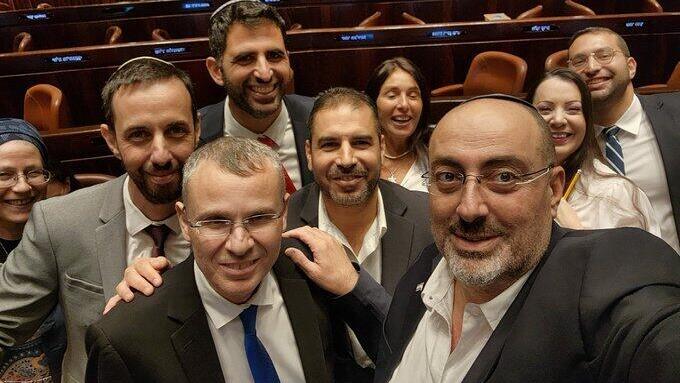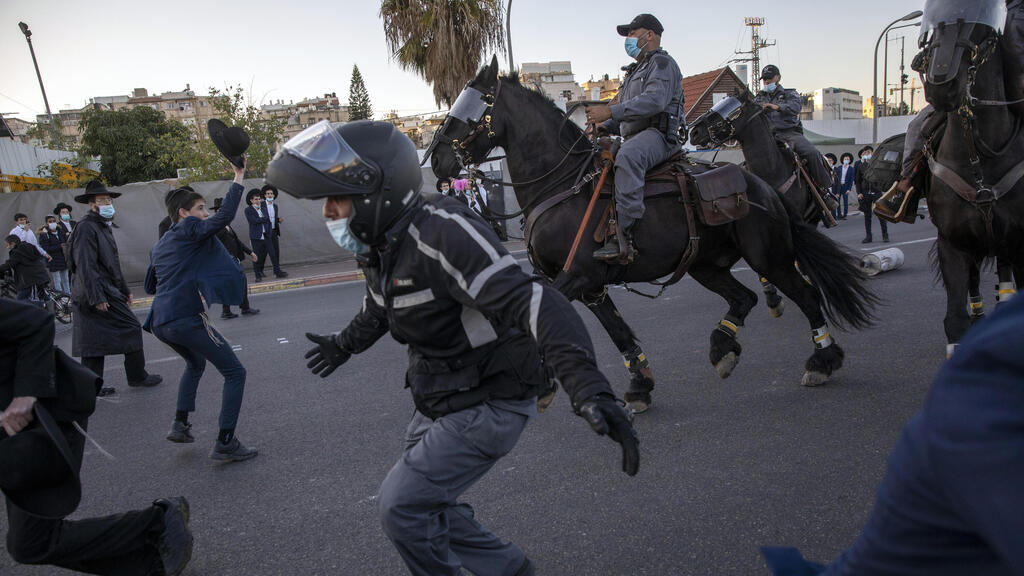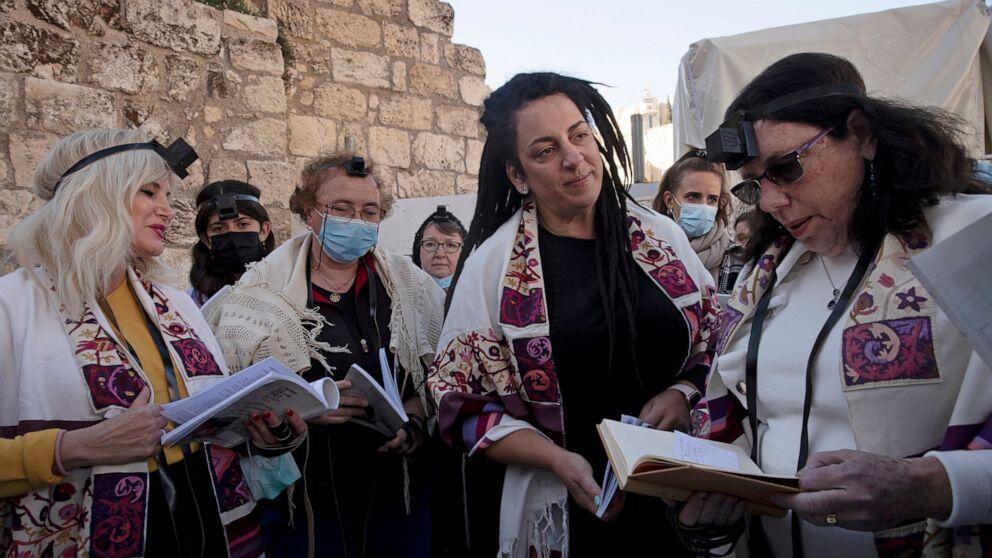Getting your Trinity Audio player ready...
After winning a 64-seat majority in the last election, members of Prime Minister Benjamin Netanyahu's coalition, many of them freshmen lawmakers, have proposed bills raising questions about their intent to change Israeli society, dealing with education, law, and religion and state, and including laws that they would benefit from personally.
More stories:
As the Knesset prepares to adjourn for the summer recess, Ynet has put together a selection of those proposed laws, some of which have evoked outrage, others removed from consideration as quickly as they were raised, while still others are already making their way through the legislative process. To be clear, not all the bills were proposed by the coalition.
4 View gallery


Coalition members celebrating their win after a judicial overhaul bill passes the Knesset
(Photo: Twitter)
Splitting authority of the Attorney General
The bill proposed by no less than 11 members of the ruling Likud Party, most serving their first Knesset term, proposes limiting the AG's role to providing legal counsel to the government and representing its members in court, while the decision to launch investigations and begin prosecutorial action would be in the hands of a State Prosecutor.
The bill, which would considerably curb the power of the AG, was proposed while Prime Minister Benjamin Netanyahu continues to be on trial for corruption in Jerusalem, and amid calls to fire the current attorney general, who was appointed by the previous government and has blocked certain coalition initiatives.
After the proposed bill evoked angry responses from the protesting public and among opposition legislators, The Likud Party issued a statement claiming the law would not be advanced without the agreement of all leaders of the parties in the coalition.
Equating military service and yeshiva - Basic Law: Torah Study
One day after the coalition passed its bill limiting the Supreme Court's use of reasonability status, curbing oversight of the courts over the government, the United Torah Judaism Party proposed a bill equating the study of the Torah to service in the Israel Defense Forces. The bill would allow ultra-Orthodox men to avoid the draft if they commit to religious studies and receive all the benefits afforded to IDF veterans.
4 View gallery


Ultra-Orthodox men clash with police in protest of the arrest of a draft dodger
(Photo: AP)
The authors of the bill said it was enshrined in the coalition agreement signed by Netanyahu and would represent the importance given by the state of Israel to Torah study and the contribution of those committed to it. However, senior members of the ultra-Orthodox party told Ynet the purpose of their bill was to prevent the Supreme Court from forcing the government to legislate an egalitarian draft bill.
Despite the Likud once again saying that the bill would not be advanced through the legislative process, the Haredi legislators are not expected to back down.
Bill allowing the prime minister to receive gifts
The law, proposed by a member of the Likud, was already in the process of legislation despite the objection of Attorney General Gali Baharav-Miara. According to the bill, elected officials would be able to receive substantial donations to fund their legal proceedings and medical expenses. Netanyahu's corruption trial includes a charge that he received gifts in the value of hundreds of thousands of shekels from Hollywood Producer Arnon Milchan while serving in office and a further hundreds of thousands from his cousin to cover the legal costs of his corruption trial. The bill will continue through the legislative process when the Knesset reconvenes in three months' time.
Aryeh Deri's second return to politics
An amendment to the Basic Law: The Government, was proposed after the Supreme Court blocked the appointment of Shas Party leader Aryeh Deri, a close ally of the prime minister's to serve as a minister in Netanyahu's government after he was thrice convicted of crimes and after he promised the court upon his sentencing last year that he would leave politics, and in exchange was granted a plea.
4 View gallery


Shas leader Aryeh Deri and Prime Minister Benjamin Netanyahu in the Knesset
(Photo: Shalev Shalom)
The latest legislation aims to circumvent the interference of the court in Deri's appointment, which would seat him back in a ministerial role.
Law prohibiting audio recordings
A bill proposed by Netanyahu ally Boaz Bismuth, a former journalist, that would prohibit the one-sided recordings of conversations after a recording made by Netanyahu's aide-turned-state witness Ari Harrow was presented as evidence in his corruption trial. If passed the bill would impose up to a five-year prison sentence and a fine of NIS 50,000 even if no damage is proven.
Death penalty for terror
The bill to impose a death sentence for acts of terror was proposed by National Security Minister Itamar Ben-Gvir's Otzma Yehudit Party as part of the coalition agreement signed with Netanyahu. The authority to execute a death sentence would be in the hands of a military court in a majority decision and would not be able to be reversed.
Despite experts' opinions claiming such legislation would be unconstitutional and would cause untold damage to Israel, it had already begun its legislative process.
Expulsion of terrorist families
After a law to revoke the citizenship or residency of convicted terrorists who receive funding from the Palestinian Authority passed the Knesset last February, another bill clearing the way for their families to also be expelled was also proposed and has passed initial legislative processes; this is likely to silence calls for the death penalty bill to be completed.
Penalty for immodest dress at Western Wall
A bill calling for a six-month prison term or a 10,000 shekel fine for being immodestly dressed at the Western Wall or attending worship that includes men and women, was proposed by the Shas party earlier this year evoking anger and concern over the government's efforts to increase the power of the religious establishment and change the secular character of the state. After Netanyahu publicly distanced himself from the law, it was not advanced.
The Supreme Court ruled earlier this month that the feminist group Women of the Wall cannot be prevented from bringing Torah scrolls into the Western Wall compound by security guards. The women have long fought to be allowed to worship at an egalitarian worship section of the compound.
4 View gallery


Members of Women of the Wall gather around a Torah scroll the group smuggled in for their Rosh Hodesh prayers marking the new month, at the Western Wall
(Photo: AP)
Prison time for blocking roads
Likud member Dan Ilouz proposed a bill to incarcerate protesters blocking roads, days after the main Tel Aviv highway was blocked for hours by a mass demonstration against the government's legislative push to overhaul the judiciary. Thus far, the bill has not advanced through the legislative process.
Dissolution of the Lawyers Association
Another proposal by a Likud member, Hanoch Milwidsky, would see the Bar Association, a non-governmental professional guild that overseas law licensing, dissolved after a government-backed candidate lost in the association's recent elections. The association's representatives currently take part and have a voice in the panel to select judges, which is also being targeted by the government's judicial overhaul.
The unchecked power of the parliamentary election committee
A bill proposed by Likud member Nissim Vaturi, an outspoken supporter of the judicial overhaul legislation and of the prime minister, proposed a bill last month that would give the Knesset's election committee, which enjoys a majority of coalition members, the ability to ban political parties from future elections, without the oversight of the Supreme Court. Although widely condemned, the bill has not been removed from consideration.


